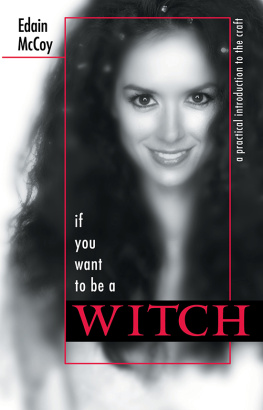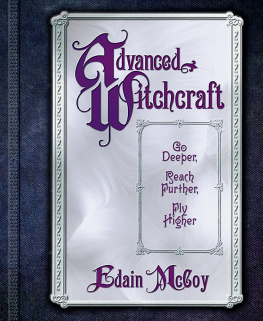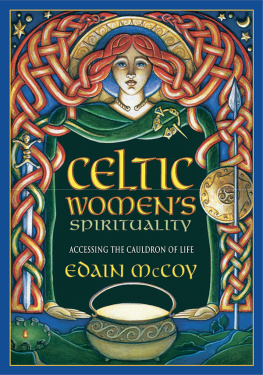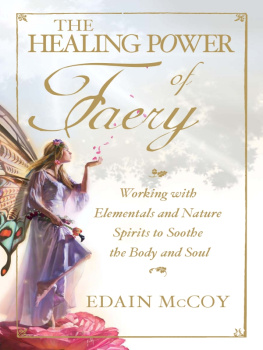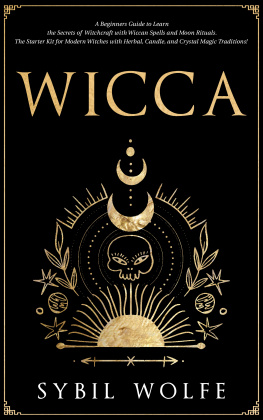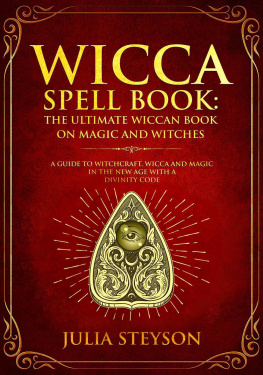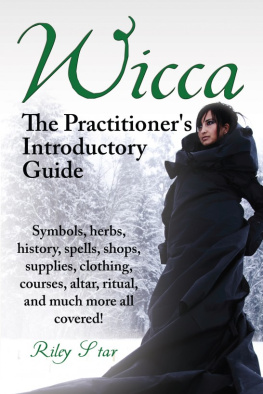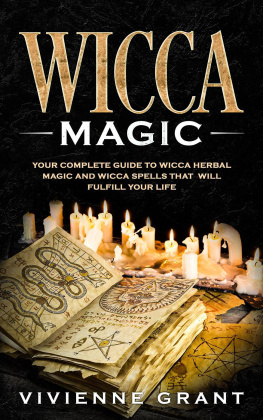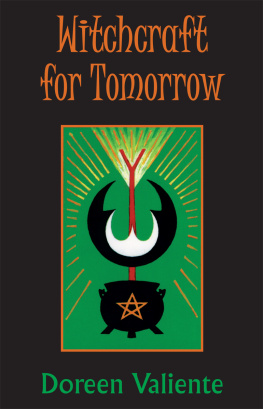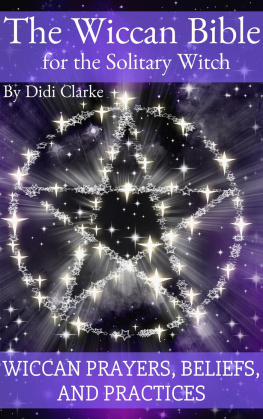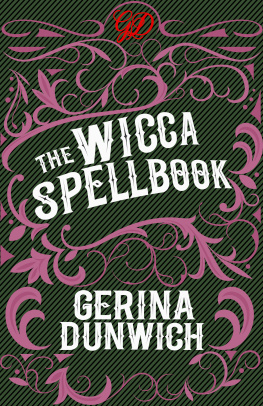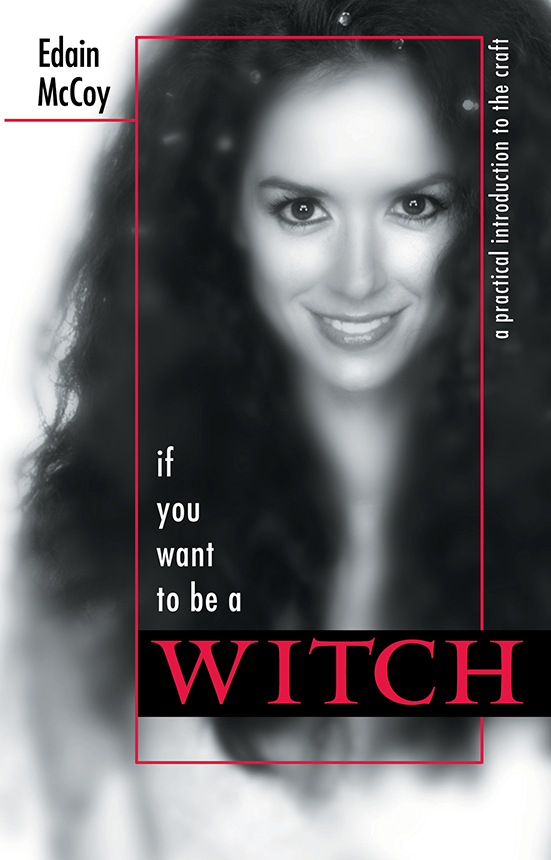If You Want to Be a Witch: A Practical Introduction to the Craft 2004 by Edain McCoy.
All rights reserved. No part of this book may be used or reproduced in any matter whatsoever, including Internet usage, without written permission from Llewellyn Publications, except in the form of brief quotations embodied in critical articles and reviews.
As the purchaser of this e-book, you are granted the non-exclusive, non-transferable right to access and read the text of this e-book on screen. The text may not be otherwise reproduced, transmitted, downloaded, or recorded on any other storage device in any form or by any means.
Any unauthorized usage of the text without express written permission of the publisher is a violation of the authors copyright and is illegal and punishable by law.
Cover model used for illustrative purposes only and may not endorse or represent the books subject.
Llewellyn Publications is an imprint of Llewellyn Worldwide Ltd.
Llewellyn Publications does not participate in, endorse, or have any authority or responsibility concerning private business arrangements between our authors and the public.
Any Internet references contained in this work are current at publication time, but the publisher cannot guarantee that a specific reference will continue or be maintained. Please refer to the publishers website for links to current author websites.
Llewellyn Worldwide Ltd.
contents
So, You Think You Wanna Be a Witch?
In the Beginning
The Birth and Rebirth of Witchcraft
A Witchs Life
The Power of Ritual
What Witches Do: The Sabbats
What Witches Do: The Esbats
Are you a good witch, or a bad witch?
The Basics of Divination
The Physics of Magick
The Craft of the Wise
Do You Still Want To Be a Witch?
Taking Your First Steps into Witchcraft
Herbs & Gemstones
Moon Signs
Resources
Glossary of Common Witchcraft Terms
Suggested Reading
introduction
so, you think you wanna be a witc h ?
Merry meet!
My name is Edain, and Ive been a Witch for more than twenty years.
No, this isnt an introduction to a twelve-step program. Merry Meet is our traditional greeting to others who follow our waysthat is, others who follow earth and nature religions. It expresses our wishes for joyous and fruitful gatherings of those of us who worship in the fullness of nature, in what we sometimes refer to as the Old Religion. When we leave one another we say, Merry part, and merry meet again. This is an expression of the good things we wish for others and our hope that our links in the web of existence will continue to flourish.
Were you reading closely? Did you catch the word religion attached to the practice of Witchcraft?
First, utmost, and beyond all other concerns, Witchcraft is a religion , probably one of the oldest on the planet, and one that gets new adherents daily all around the world. They may worship pantheons youre not familiar with, but they are trying to follow a positive path to the creators. Understanding this is not only your lesson number one, but a sentence you should emblazon upon your brain in flashing neon so it will never be forgotten:
Witchcraft is a religion, and its primary purpose is the worship of and the seeking of reunion with the being or beings who created all life.
It may not be easy at first for you to make that mental leap when many churches and society in general have for centuries hammered into peoples brains the evils of Witchcraft. (Note that none of them can give you a valid explanation of those evils; theyre just sure theyre there.) On the other hand, when seeking solid information on the Craft suitable for the beginner at your local bookstore, the shelves seem to groan under the weight of all the books on Witchcraft and its related disciplines. It can overwhelm not only novices but intermediate students as well.
Where do you start?
You start right here, with this primer on basic Witchcraft. If you picked up this book, I assume youre interested in Witchcraftthe Craft, as we sayor, at the very least, youre curious to learn more about this fast-growing and thriving faith. For the next two hundred pages or so, Ill be your guide into this spiritual movement that is both the oldest and newest on the planet. Ill try to help you sort out the confusing names and concepts that bombard you from the book stacks, and Ill try to steer you in the direction you want to go.
Dont worry if another newcomer picks out different books than you. We all have unique ways of learning, our own talents, and our own interests. Some authors will resonate with you, others may leave you unmoved. Glance through everything first, then select one or two books to start with. By the time youve worked through those, youll know if this is the path you wish to travel in this lifetime.
chapter one
in the beginning...
What do you already know about Witchcraftor perhaps I should I ask, what do you think you already know? Why are you interested? There are easier ways to live your life than to be a part of any minority. What do you expect to get out of Witchcraft that makes the quest worth the struggle, and what do you expect to give back to it? Will you wear your religion with pride for all to see? Will you be an in-your-face militant, a sort of Witchy fundamentalist? Will you quietly walk your spiritual path alone with your deities or seek contacts for friendship, exchange of information, and perhaps group or coven worship?
What all Witches have in common is that we follow a nature- or earth-based religion. However, we each tread a slightly different path in our search for our creator, and each of our lives is filled with varying needs and desires, but, with faith and effort, we all hope to end up in the same place.
Before we begin, I want to prepare you for the flood of names and terms that accompanies the Craft. Witchcraft, sometimes referred to as Wicca or Eclectic Wicca, comprises the indigenous religions of western Europe, making it collectively one of the oldest religions on the planet. A Witch and a Wiccan may or may not be the same thing. Wicca began as a specific Anglo-Welsh tradition in England around the turn of the twentieth century, but today it is a tag often attached to other traditions (Celtic Wicca, Russian Wicca, etc.). There are two possible origins of the word Witch, one being the Old English wyk meaning to shape or to bend, and the other being the Anglo-Saxon wit meaning to possess knowledge or wisdom. From wyk come the Craft words wicce and also the modern English word wicked. From the Anglo-Saxon root word wit, we get the Craft words wita and witta. Like Wicca, the terms Wicce and Witta have ceased to be spiritual descriptions in their own right, and its not uncommon to see Wicce or Witta combined with other cultural labels to create an entirely new Pagan tradition.

